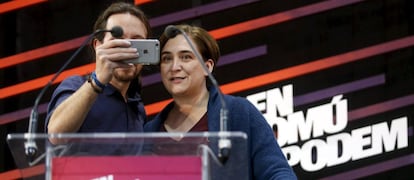Barcelona mayor praises Podemos after criticizing leader’s “arrogance”
New book out about Ada Colau comes at a difficult time for the anti-austerity party

Barcelona Mayor Ada Colau on Monday rushed to defend Podemos after calling its leader “arrogant” in a new book about her.
“Podemos is the best news of the last few decades for institutional politics, it is the best ally for change,” she wrote on her Twitter account.
In the book Ada, la rebelión democrática (or, Ada, the democratic rebellion) by the journalist Joan Serra, who followed the social activist’s rise to the mayor’s office, Colau states that “there is a certain style displayed by Pablo [Iglesias] and by the core driving members behind Podemos that we do not connect with.”
If Iglesias wants to keep Catalonia as a major supplier of votes, he will have to get along with the mayor of Barcelona
“It makes me feel more Catalan than ever,” she is quoted as saying. “It is a difference in style, a personal and political difference. Barcelona en Comú [her own political group] is not Podemos. It never was.”
Although the interviews took place in January, the book release comes at a delicate time for the anti-austerity party, which has recently faced several resignations and is struggling with an internal cohesiveness problem.
In an effort to end the growing rift within the party, Iglesias on Friday named a consensus figure to take the place of the party’s organization secretary, Sergio Pascual, who was sacked last week. Pablo Echenique, it is hoped, will help narrow the gap between Podemos’s various factions at a time when Spain’s political parties are still struggling to find a new prime minister, three months after an inconclusive general election.
Podemos won 69 seats on December 20 thanks in part to its association with regional forces in Galicia, Valencia, the Basque Country and Catalonia. In the latter region, it partnered with Barcelona en Comú, one of whose founding members is Ada Colau.

In the book, Colau underscores her differences with Podemos and her desire to remain as independent from the anti-austerity party as possible.
The mayor, the book shows, feels that Podemos took advantage of the groundwork performed by social activists like herself – for years Colau headed the PAH, a support group for embattled mortgage holders – yet failed to recognize those groups’ contributions to the protest movement against Spain’s political and economic elites.
“Podemos made a cold, rational analysis, describing a window of opportunity,” she says in the book. “They were right about that, nobody had taken the step and they were the first. There was a context of opportunity, but it hadn’t been generated by them but by many other people like PAH, whom they neither understood nor respected.”
But despite their differences, the political affinities remain, and their electoral strategies are likely to keep coinciding. Colau leaned on Iglesias to reach the mayor’s office in Barcelona, and the head of Podemos used Colau’s help to win seats in Catalonia at the general election.
Opinion polls
And if Iglesias wants to keep Catalonia as a major supplier of votes, he will have to get along with the mayor of Barcelona. According to a Metroscopia poll conducted for EL PAÍS, Podemos’s prospects are weaker in provinces where it is running all by itself. If new elections were held today, a Colau-Iglesias coalition would again trump the competition in Catalonia.
Meanwhile, in Madrid, the survey shows that Podemos would fall from second to the fourth most-voted force.
English version by Susana Urra.
Tu suscripción se está usando en otro dispositivo
¿Quieres añadir otro usuario a tu suscripción?
Si continúas leyendo en este dispositivo, no se podrá leer en el otro.
FlechaTu suscripción se está usando en otro dispositivo y solo puedes acceder a EL PAÍS desde un dispositivo a la vez.
Si quieres compartir tu cuenta, cambia tu suscripción a la modalidad Premium, así podrás añadir otro usuario. Cada uno accederá con su propia cuenta de email, lo que os permitirá personalizar vuestra experiencia en EL PAÍS.
¿Tienes una suscripción de empresa? Accede aquí para contratar más cuentas.
En el caso de no saber quién está usando tu cuenta, te recomendamos cambiar tu contraseña aquí.
Si decides continuar compartiendo tu cuenta, este mensaje se mostrará en tu dispositivo y en el de la otra persona que está usando tu cuenta de forma indefinida, afectando a tu experiencia de lectura. Puedes consultar aquí los términos y condiciones de la suscripción digital.








































